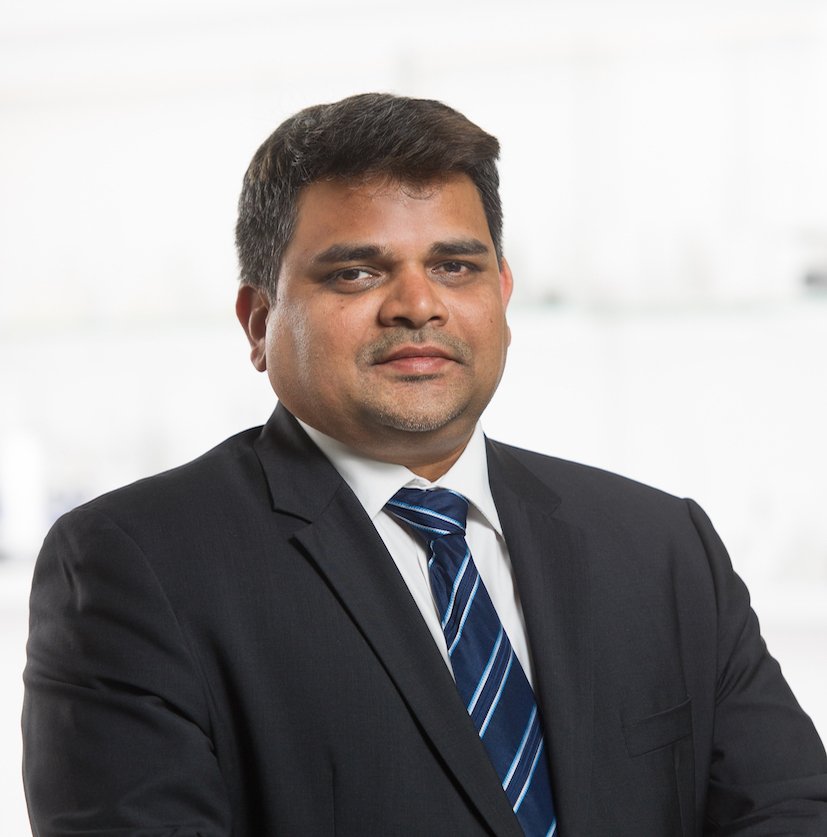"Our platform 3DAgainstCorona is about how additive manufacturing can help fight COVID-19"
August 06, 2020 | Thursday | Interviews
BioSpectrum interacted with Anand Prakasam, Country Manager, EOS GmbH India, from Chennai & Maltesh Somasekharappa, CEO and Co-Founder of Supercraft3D (a start-up that works with EOS in the medical implants space) from Bengaluru.
Image Caption- Anand Prakasam, Country Manager, EOS GmbH India
Germany headquartered EOS is the leading technology provider worldwide for industrial 3D printing of metals and plastics. Founded as an independent company in 1989, they are pioneers and innovators for integrated solutions in additive manufacturing (AM). Of late, this field of additive manufacturing or 3D Printing is helping the medical sector during the pandemic. To get a better understanding of this aspect, BioSpectrum interacted with Anand Prakasam, Country Manager, EOS GmbH India, from Chennai & Maltesh Somasekharappa, CEO and Co-Founder of Supercraft3D (a start-up that works with EOS in the medical implants space) from Bengaluru.
Edited Excerpts
How is EOS Helping the Medical Fraternity during this pandemic?
Anand Prakasam- Globally EOS GmbH launched a versatile online platform and LinkedIn Group to support the battle against Covid-19 on all levels in April. Dubbed as 3DAgainstCorona, we developed an open platform initiative where we are offering free access to information around how additive manufacturing can enable manufacturers to address critical medical requirements during the COVID-19 crisis. We have also published select STL files of essential medical equipment on the platform, for everyone’s access. STL files of equipment like emergency masks for hospital ventilators and face shields, are available to download, free of cost.
Along with customers and ecosystem partners, our technology is used in many projects like, hands-free 3D printed door openers, face masks, respiratory equipment’s, and nasal swabs. Many companies use our service providers that specialize in additively manufactured parts for their entry into the 3D printing sector. We are also working for many research projects and academia to bring use cases into the medical space.
How can AM assist in medical equipment, eg. making masks?
Anand Prakasam- EOS is joining forces with material suppliers, customers, and partners for on-demand manufacturing of medical equipment and other critical products. EOS can currently provide large discounts on polymer powder suited for medical applications to customers/service providers in order to ensure that the cost of the end medical products are affordable. We also provide critical consulting and technical support on design and process optimisation support.
Has EOS seen an increase in 3D Printed nasal swabs for COVID-19 testing?
Anand Prakasam- In India, due to our large population, the demand for nasal swabs is very high. We are working with few MSME’s in developing these swabs and have provided few samples for testing. We are awaiting the results. Considering the current situation in India the need for these swabs would increase as we have crossed 9 lakhs infected patients.
What are the recent developments in the AM space?
Anand Prakasam- There are many new developments in the medical space for AM. We are now able to consider many more parameters for 3D printed medical equipment as well as for 3D printed pharmaceutical tablets. The parameters include drug delivery, DfAM incorporated lab equipment, hybrid DfAM equipment (to address pandemic situation), 3D Printed tablets for personalised dosage, size, and dissolving time of tablets.
In fact, in February, our sister company AMCM announced a partnership with Merck for 3D printing of tablets. The partnership targets GMP-conform (Good Manufacturing Practice) tablet formulation development and production for clinical trials in a first step and later also commercial manufacturing services. The vision of this partnership is to to allow flexible and sustainable local tablet production according to specific market requirements as well as adaptation to patient needs. Next-generation tablet manufacturing through 3D printing is a project in the Innovation Center at Merck headquarters in Darmstadt, Germany. Project teams work on developing and upscaling ideas to create new businesses between and beyond the three Merck business sectors of Healthcare, Life Science and Performance Materials.
In the medical implants sector, patient specific implants are being explored with medical institutions across India. In May Hosmat Hospital, Bangalore used the first ever 3D Printed titanium disc-shaped implant in Karnataka on an eighteen-year-old girl. This was printed by one of our partners SuperCraft3D using the EOS M290 system. It took about 36 hours to print the model and another 10 hours were spent on printing the model of the bone, which acts as a reference for the doctors at Hosmat Hospital to plan the surgery.
Maltesh Somasekharappa- It is possible to reduce the delivery times of these titanium customs implants even earlier than 48 hours. Our team is working on optimising the process chain. The whole project was delivered in 2 days. The interest in 3D Printed surgical instruments is also emerging in the Indian medical fraternity.









